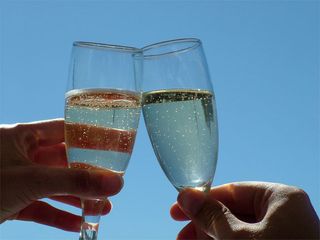The Truth About Hangovers Revealed in Drunken Study

If you've ever had one too many drinks during a night out, you're probably familiar with the dreaded aftermath: the hangover. Turns out, your liquor of choice could influence your morning headache.
A new study finds that, compared with vodka, if you down too much bourbon, you're likely to have a worse hangover. But when it comes to your next-day activities, it doesn't matter which of the two beverages you drink, your performance is likely to be the same.
The study involved 95 participants ages 21 to 33 who were heavy drinkers, but had no history of alcohol abuse. Their arduous task: Get drunk. And they got paid — $450, to boot!
The authors weren't simply looking at the effects of alcohol, however. They were specifically interested in the levels of toxic substances called congeners in the alcohol. These compounds are byproducts of alcohol fermentation, and they are partly responsible for the alcohol's color. Darker liquors and wines have more congeners than lighter ones — for instance, the amount of congeners in bourbon is 37 times the amount in vodka, according to the study.
"While the alcohol alone is enough to make many people feel sick the next day, these toxic natural substances can add to the ill effects as our body reacts to them," Damaris Rohsenow, a professor at the Center for Alcohol and Addiction Studies at Brown University, said in a statement.
Rohsenow and her colleagues wanted to investigate whether or not congener levels had any effect on hangover symptoms the following day, or the ability of people to perform certain tasks.
Participants consumed either vodka or bourbon mixed with caffeine-free cola on one night, until until they had drunk about the minimum amount required to induce a hangover, the researchers say.
Sign up for the Live Science daily newsletter now
Get the world’s most fascinating discoveries delivered straight to your inbox.
On a separate night, the participants unknowingly drank a placebo, in this case, cola with tonic and a few drops of either bourbon or vodka in order to avoid serious suspicions that the beverage was in fact a placebo.
Once the subjects' breath alcohol levels had reached about zero, they were asked to fill out questionnaires regarding how they felt. They also performed tasks to measure their cognitive function, which tested the subjects' ability to pay close attention to a task while also making rapid choices.
Not surprisingly, alcoholic drinks made people feel more hung-over than the placebo, but bourbon made people feel even worse than vodka, Rohsenow said.
And while alcohol also impaired the subjects' performance on the cognitive tasks, "they did no worse after bourbon than after vodka," Rohsenow said.
The study also looked at the effects of alcohol on sleep, and found that although alcohol did disrupt sleep, people who drank bourbon slept just as well as those who drank vodka.
"This means that bourbon's greater effects on hangover are not due to it having greater effects on sleep," Rohsenow said.
The results will be published in the March 2010 issue of the journal Alcoholism: Clinical & Experimental Research. The study was funded by the National Institute on Alcohol Abuse and Alcoholism, and the National Center for Research Resources, among others.

Rachael is a Live Science contributor, and was a former channel editor and senior writer for Live Science between 2010 and 2022. She has a master's degree in journalism from New York University's Science, Health and Environmental Reporting Program. She also holds a B.S. in molecular biology and an M.S. in biology from the University of California, San Diego. Her work has appeared in Scienceline, The Washington Post and Scientific American.
